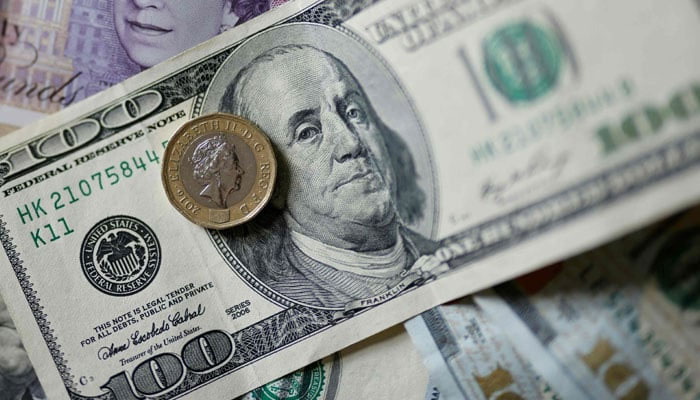Forex reserves surge to $10.7bn after IMF tranche: SBP
KARACHI: Pakistan’s central bank foreign exchange reserves have increased to $10.7 billion after the receipt of the first tranche of the $7 billion loan from the International Monetary Fund, Governor of the State Bank of Pakistan (SBP) Jameel Ahmad said on Wednesday.
That is enough to fund more than two months of imports. The SBP’s reserves stood at $9.53 billion as of September 20. “Our reserves have risen to $10.7 billion following the IMF loan disbursement, sufficient to cover more than two months’ imports,” Ahmad told reporters at ‘The Bank of the Future Forum’ event.
The increase in foreign reserves has aided in easily covering import and other obligations, fostering market confidence, he said. The SBP received $1.03 billion from the IMF as the first tranche of a $7 billion bailout last week.
The SBP’s governor emphasized that a number of positive developments had taken place in the foreign exchange market, noting that the present state of reserves and liquidity was satisfactory and that all outstanding payments, including dividends, had been made.
The SBP’s forward book has drastically decreased, remittances and inflows through Roshan Digital Accounts have increased, all of which have strengthened the market’s liquidity position, he claimed, meaning that there is currently no pressure on the FX market.
According to Ahmad, the rate of inflation is gradually decreasing. In September, the consumer price index inflation slowed to 6.9 per cent, falling within the SBP’s medium-term target range of 5.0 per cent to 7.0 per cent.
For the first time, the government has begun buying back own securities, demonstrating that it has plenty of funds on hand and can easily cover its financing needs without having to borrow money from the banks, he said.
The money market is responding positively as a result, and secondary market yields have fallen significantly. This will contribute to a reduction in borrowing costs, which benefits the economy. Because the government no longer requires as much funding from banks, banks will be able to lend these monies to the private sector.
He disclosed that three years prior, the SBP had provided a framework for the promotion of digital banks in Pakistan. “We have already granted five banks our permission in principle to establish digital banks under this framework; one of these banks will begin operations in the next two to three months, and the other four will start operations early next year. Our goal is for all five digital banks to begin operations by the middle of next year,” Ahmad said.
He added that rapid technological change has not only enabled banks to offer innovative financial services to customers but also empowered regulators to ensure compliance effectively and efficiently through advanced data collection and processing capabilities. The event, organized by Systems Limited, brought together distinguished dignitaries, eminent industry leaders, and fintech experts to discuss the evolving landscape of the banking sector in Pakistan and globally.Earlier, in a key note address, the governor said that the SBP’s digital transformation started in 2002, when it implemented the Temenos banking system, and an ERP system for non-banking transactions, as well as a data warehouse for massive data-related requirements. In 2008, the SBP implemented the real-time gross settlement system called PRISM for processing wholesale, large-value, institutional payments. Recently, the SBP established its state-of-the-art, Tier-3 data centre, the first of its kind in Pakistan.
The governor shared that in 2008, the SBP issued regulations for branchless banking services to enable the delivery of basic banking services from retail stores and kiryana shops. This initiative has resulted in a significant increase in the number of unique bank accounts, from 16 per cent of the adult population in 2018 to 64 per cent in 2024.
He shared that in 2022, the SBP issued the framework for establishing digital banks in Pakistan to further facilitate the entry of IT-enabled, non-banking entities into the financial services industry. As a result, in-principle approvals were issued to five applicants who will shortly start pilot operations in the country.
He shared that Raast, the instant payment system based on the ISO 20022 standard, was launched in 2021. In a short span of almost three years, Raast has processed around 850 million transactions valuing over Rs19 trillion. Today, with 38 million unique Raast IDs, the system processes an average of 2.5 million transactions a day. He shared that the SBP is also working on integrating Raast with the Arab Monetary Fund’s instant payment system called Buna to facilitate millions of Pakistanis living in Arab countries in sending their remittances to Pakistan with ease and convenience.
The governor shared that as a result of the SBP’s efforts, Pakistan now has around 59 million branchless banking wallets, 19 million mobile banking apps, another 3.7 million e-money wallets, and 12 million internet banking users. Since 2020, the overall number of retail transactions processed digitally has increased by 30 per cent, and the share of digital payments in total retail payments by volume has risen from 76 per cent in FY23 to 84 per cent in FY24. The number of transactions processed using mobile and internet banking is growing at an annual rate of 70 per cent and 30 per cent, respectively. This is not surprising as the majority of our population is young and adept at using mobile apps.
The governor shared that it is heartening to see the emergence of a vibrant fintech sector in Pakistan. These fintech companies are striving hard to identify new markets and use cases and offer their tech-enabled services. He encouraged the IT sector to play a pivotal role in this transformation.
-
 Why Nicole Kidman 'not Rushing' Into Love After Split From Keith Urban?
Why Nicole Kidman 'not Rushing' Into Love After Split From Keith Urban? -
 Benny Blanco's Dirty Feet In Debut Podcast Divide The Internet
Benny Blanco's Dirty Feet In Debut Podcast Divide The Internet -
 Jeffrey Epstein Blamed King Charles As Andrew Left Trade Enjoy Job
Jeffrey Epstein Blamed King Charles As Andrew Left Trade Enjoy Job -
 King Charles Asked To Lean On Princess Anne To Avoid ‘media Circus’
King Charles Asked To Lean On Princess Anne To Avoid ‘media Circus’ -
 Passenger Wins £10,000 Payout From Heathrow Airport After 100 Ml Liquids Dispute
Passenger Wins £10,000 Payout From Heathrow Airport After 100 Ml Liquids Dispute -
 Eric Dane's Costar Under Fire For Hurling Accusations At Him After His Death
Eric Dane's Costar Under Fire For Hurling Accusations At Him After His Death -
 Queen Camilla Greets The Paddington Bear At BBC’s 500 Words Grand Final
Queen Camilla Greets The Paddington Bear At BBC’s 500 Words Grand Final -
 Chinese Astronauts Finally Reveal Why Spacecraft Left Them ‘stranded’ For 437 Days In Space
Chinese Astronauts Finally Reveal Why Spacecraft Left Them ‘stranded’ For 437 Days In Space -
 Sinitta Makes Shock Admission About Marriage To Andy Willner Post Simon Cowell Heartbreak
Sinitta Makes Shock Admission About Marriage To Andy Willner Post Simon Cowell Heartbreak -
 Bill Gates Calls Ties To Jeffrey Epstein 'huge Mistake,' Reveals Past 'affairs'
Bill Gates Calls Ties To Jeffrey Epstein 'huge Mistake,' Reveals Past 'affairs' -
 Switzerland Announces One-time Compensation For Swiss Bar Fire Victims
Switzerland Announces One-time Compensation For Swiss Bar Fire Victims -
 Ryan Coogler Shares Thoughts About Building Community Of Actors Amid 'Sinners' Success
Ryan Coogler Shares Thoughts About Building Community Of Actors Amid 'Sinners' Success -
 Heidi Klum Gushes Over Diplo Collab 'Red Eye' Despite DJ Falling Asleep During Video
Heidi Klum Gushes Over Diplo Collab 'Red Eye' Despite DJ Falling Asleep During Video -
 Israel Behind Majority Of Journalist Deaths Worldwide, Watchdog Claims
Israel Behind Majority Of Journalist Deaths Worldwide, Watchdog Claims -
 'It Would Become A Circus' : Inside Jane's Turmoil For 'little Sister' Fergie Whose Hidden From The World
'It Would Become A Circus' : Inside Jane's Turmoil For 'little Sister' Fergie Whose Hidden From The World -
 Inside Cardi B's Real Feelings Related To Stefon Diggs Split Post One Year Of Romance
Inside Cardi B's Real Feelings Related To Stefon Diggs Split Post One Year Of Romance




